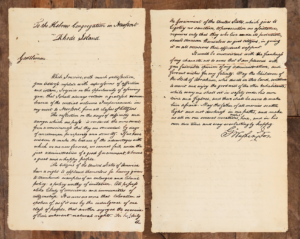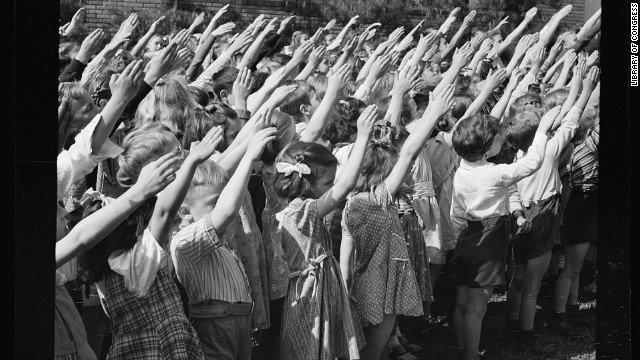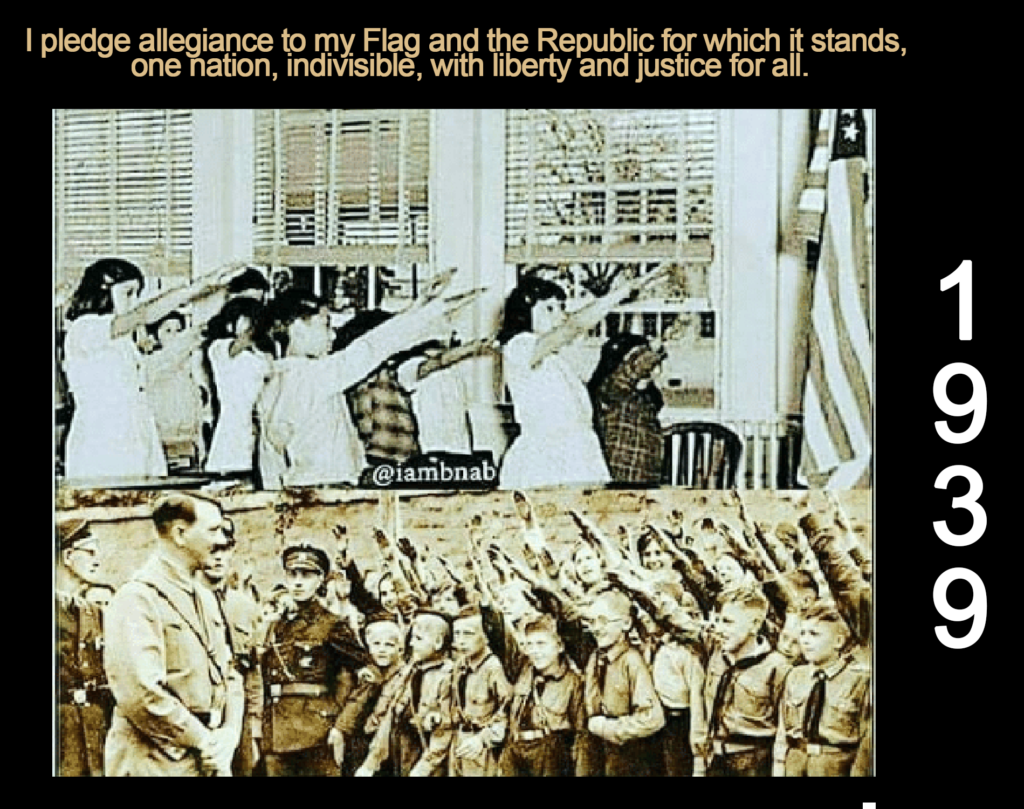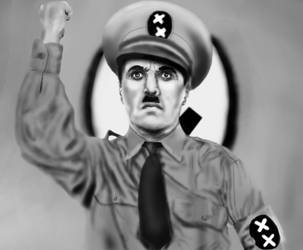Today, as an American, grateful for all that has come before, I will celebrate our anniversary. Sadly, as an Atheist, as a Jew, and as a patriot, I will not be able to recite America’s Pledge of Allegiance.
I would gladly recite the original words of the Pledge:
“I pledge allegiance to my Flag and the Republic for which it stands, one nation, indivisible, with liberty and justice for all.“
This original pledge is very different from the pledge as rewritten in the McCarthy era:
“I pledge allegiance to the flag of the United States of America, and to the republic for which it stands, one nation, under God, indivisible, with liberty and justice for all.”

Gentlemen:
While I received with much satisfaction your address replete with expressions of esteem, I rejoice in the opportunity of assuring you that I shall always retain grateful remembrance of the cordial welcome I experienced on my visit to Newport from all classes of citizens.
The reflection on the days of difficulty and danger which are past is rendered the more sweet from a consciousness that they are succeeded by days of uncommon prosperity and security.
If we have wisdom to make the best use of the advantages with which we are now favored, we cannot fail, under the just administration of a good government, to become a great and happy people.
The citizens of the United States of America have a right to applaud themselves for having given to mankind examples of an enlarged and liberal policy—a policy worthy of imitation. All possess alike liberty of conscience and immunities of citizenship.
It is now no more that toleration is spoken of as if it were the indulgence of one class of people that another enjoyed the exercise of their inherent natural rights, for, happily, the Government of the United States, which gives to bigotry no sanction, to persecution no assistance, requires only that they who live under its protection should demean themselves as good citizens in giving it on all occasions their effectual support.
It would be inconsistent with the frankness of my character not to avow that I am pleased with your favorable opinion of my administration and fervent wishes for my felicity.
May the children of the stock of Abraham who dwell in this land continue to merit and enjoy the good will of the other inhabitants—while everyone shall sit in safety under his own vine and fig tree and there shall be none to make him afraid.
May the father of all mercies scatter light, and not darkness, upon our paths, and make us all in our several vocations useful here, and in His own due time and way everlastingly happy.
— G. Washington
The Pledge of Allegiance is just over a century old. In 1892, Francis J. Bellamy, a socialist and patriot, created the salute to the flag as an effort to address the lingering pain of the civil war. White southerners were still angry, the KKK was rampant in the South while, in the North, new Americans, of diverse origins, had come to America not for religion but for opportunity. Bellamy wanted all Americans to feel loyalty to this country. In 1892 the pledge was intended as a way of recognizing the patriotism of all citizens.
Bellamy’s intent was foreshadowed by non less than George Washington. Shortly after the Revolution, George Washington wrote to the Jews of Newport, telling them that that they did not need any special tolerance, “If we have wisdom to make the best use of the advantages with which we are now favored, …. …. All possess alike liberty of conscience and immunities of citizenship. It is now no more that toleration is spoken of as if it were the indulgence of one class of people that another enjoyed the exercise of their inherent natural rights, for, happily, the Government of the United States, which gives to bigotry no sanction, to persecution no assistance, requires only that they who live under its protection should demean themselves as good citizens in giving it on all occasions their effectual support.”

American Children saluting the Flag before 1942, The Bellamy Salute consisted of each person extending his or her right arm straight forward. With palms outstretched and fingers pointing toward the flag, Americans recited: “I pledge allegiance to my Flag and the Republic for which it stands, one nation, indivisible, with liberty and justice for all.”
Back in Washington’s time, America had not yet experienced the religious revival that brought the justification of the genocide of indigenous Americans under Andrew Jackson and .. ultimately .. the justification for the civil war. Bellamy wanted to heal the wounds from that war.
To make the words have meaning, Bellamy tied the words to a ritual .. a way of saluting the flag.

 Under pressure from Joe McCarthy and his followers, Dwight D. Eisenhower added the phrase “under God” just after “one nation.” Eisenhower declared: “In this way we are reaffirming the transcendence of religious faith in America’s heritage and future; in this way we shall constantly strengthen those spiritual weapons which forever will be our country’s most powerful resource in peace and war.”
Under pressure from Joe McCarthy and his followers, Dwight D. Eisenhower added the phrase “under God” just after “one nation.” Eisenhower declared: “In this way we are reaffirming the transcendence of religious faith in America’s heritage and future; in this way we shall constantly strengthen those spiritual weapons which forever will be our country’s most powerful resource in peace and war.”